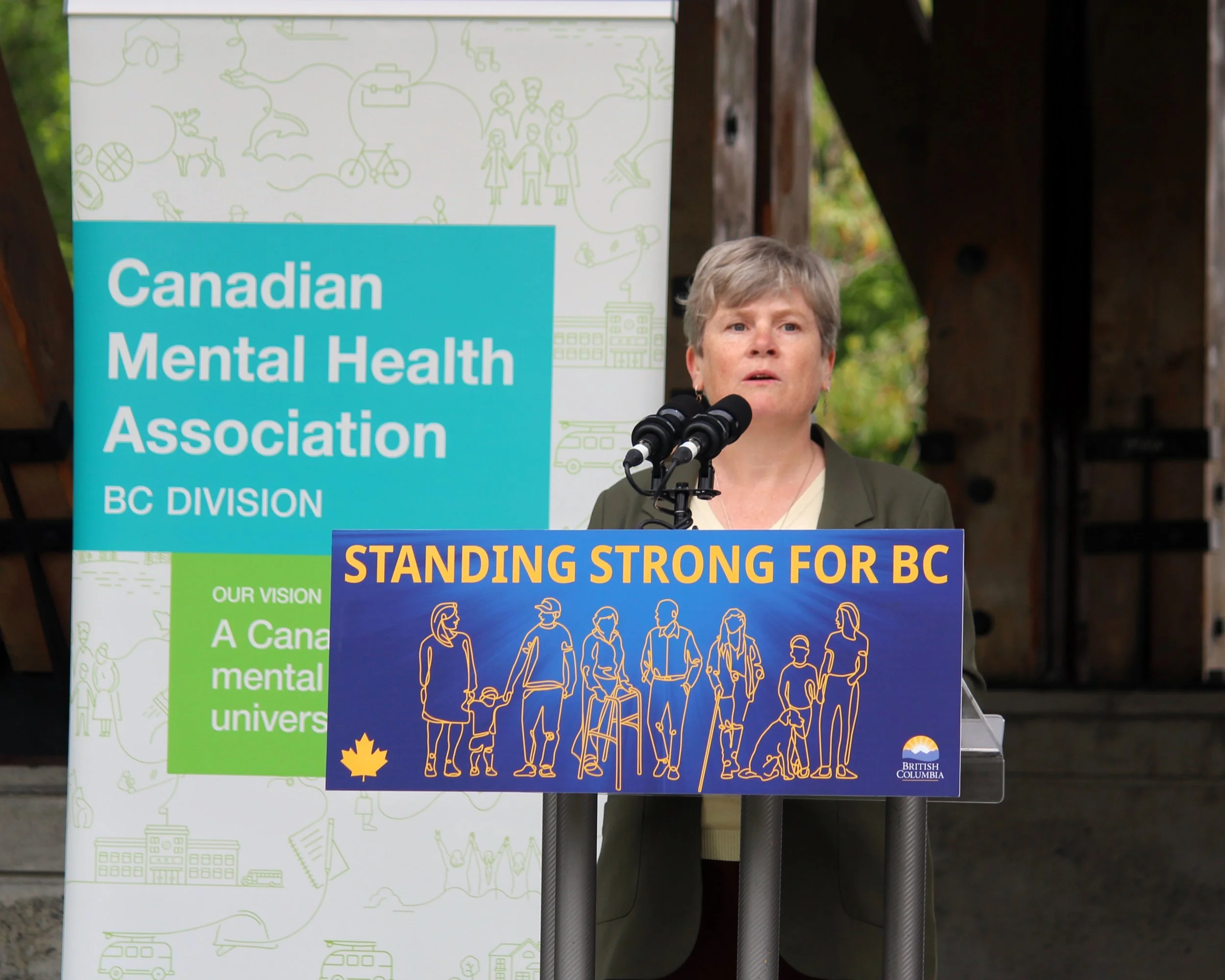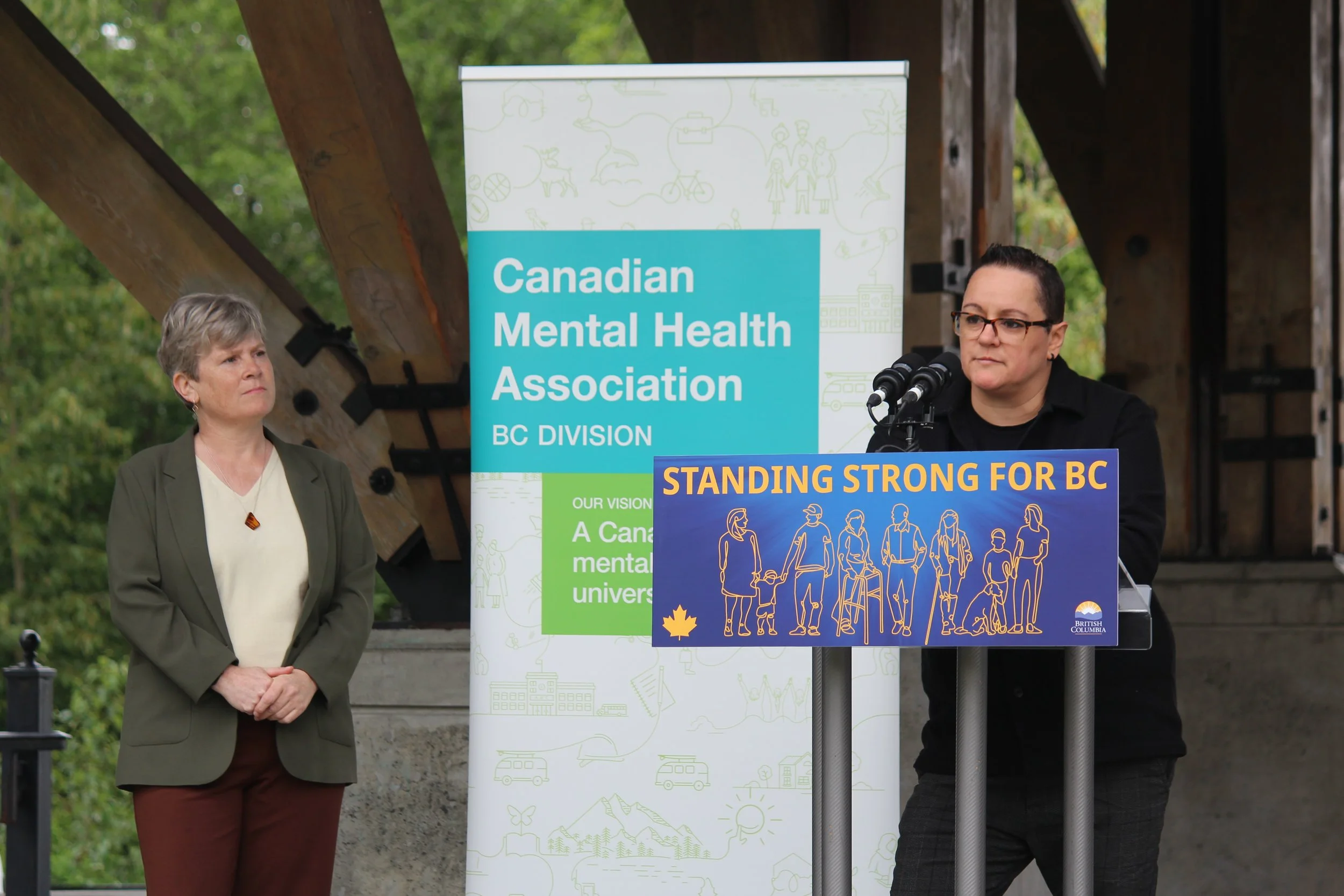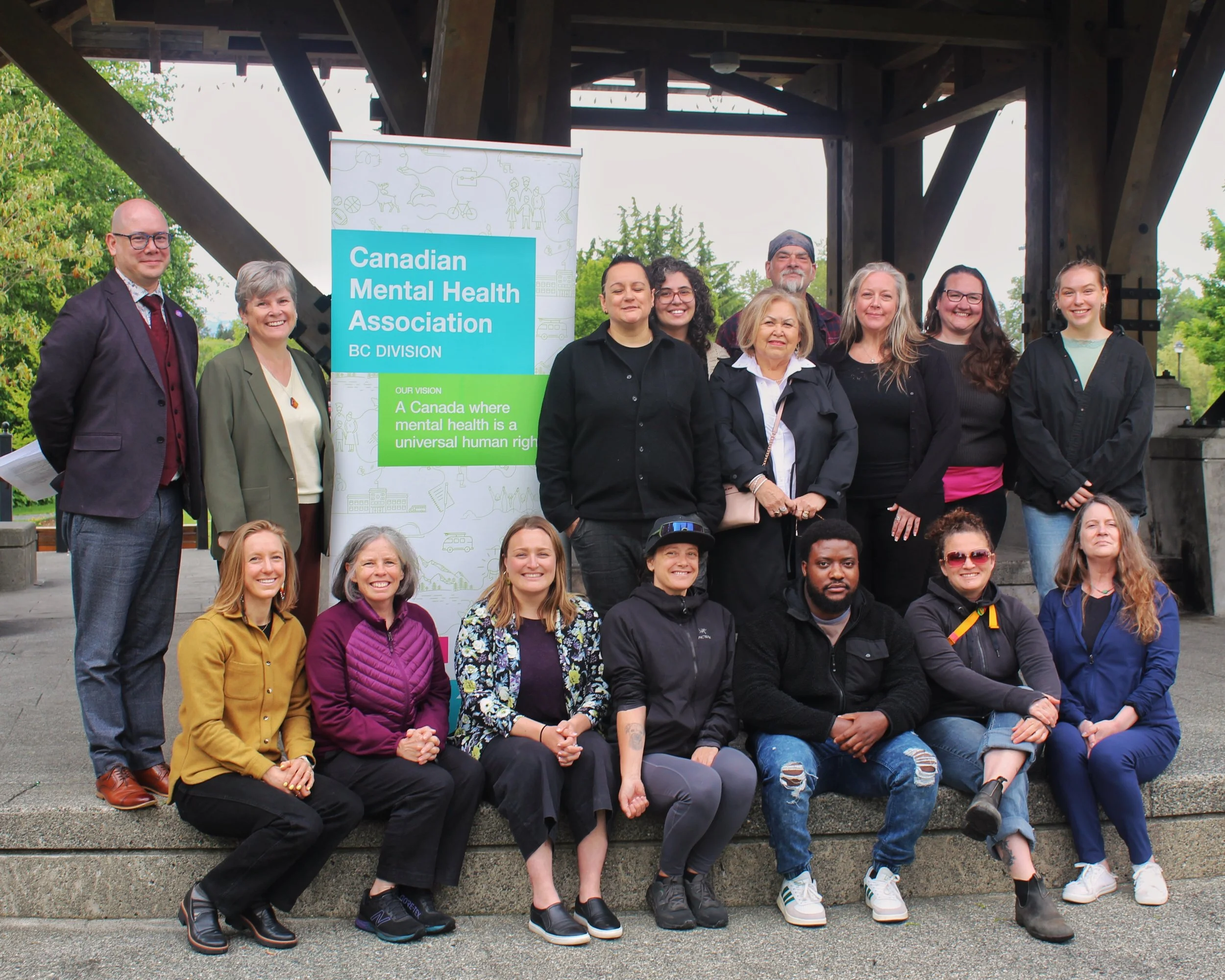Health Minister formally announces Community-Led, Crisis Response in Comox Valley
At a press conference in Courtenay, B.C., Minister Osborne described the service as helping people in crisis get timely and compassionate support from people who truly understand their experience. Photo: Heather Watson / CHLY 101.7 FM
On Tuesday, May 20th, B.C.’s Minister of Health Josie Osborne formally announced the Crisis Response, Community-Led team (or CRCL, pronounced “circle”) expanding to the Comox Valley. Minister Osborne was joined at the press conference in Simms Millennium Park in Courtenay by K’ómoks Elder Fernanda Pare, K’ómoks Chief Nicole Rempel, CEO of the Canadian Mental Health Association (CMHA) BC Division Jonathan Morris, and AVI Health and Community Services Program Coordinator Nicole Morrison.
“ Working in partnership with the K'ómoks First Nation, AVI Health and Community Services, and the Canadian Mental Health Association B.C. Division, I am really honoured to be here today with everybody to formally announce the Comox Valley CRCL, or Crisis Response, Community-Led team that is established, that is here, that is working and is serving people in the Comox Valley,” Minister Osborne said.
In her announcement, the health minister acknowledged this increase in complex mental health issues and substance use challenges throughout the province, and expressed how everyone, including people with mental health and addictions challenges, deserves to feel safe in their own neighbourhoods and communities.
“By combining the clinical expertise of people together with the knowledge of people who've lived through similar experiences, this is a community-led approach that offers a more empathetic and effective response that can make a real difference in somebody's path to recovery,” she said.
Osborne described the service as helping people in crisis get timely and compassionate support from people who truly understand their experience.
“This might include those who are experiencing thoughts of suicide or self-harm, feelings of grief and panic and anxiety, or acting in feeling in ways that is distressing. And the CRCL team helps to deescalate the situation, ensures and plans for the safety of the person in crisis, and connects them to services that support their longer term needs,” she said.
Formerly known as Peer Assisted Care Team (PACT), CRCL originated as a pilot project in North and West Vancouver. It officially launched in January of 2023 and is currently operating in five communities. Locally, the program soft-launched in October 2024 servicing the K’ómoks First Nation, and expanded in December to include all people living in the Comox Valley.
K’ómoks Chief Nicole Rempel spoke to the importance of CRCL partnering with K’ómoks First Nation, and not only being community-led, but Indigenous-led as well.
“Indigenous communities have lost too many of our people, too many lives taken by trauma, addiction, and systems that were never built with us in mind. Our communities have been grieving. Our communities have been asking for help, but too often we are met with silence, delays, or responses that do more harm than good. Mental health crises should never be treated as crimes, and yet for Indigenous people, especially those who are visibly Indigenous, the response we receive is not care, and we are often left more vulnerable. There's a deep and dangerous gap in mental health crisis response for all those suffering, especially in the space between hospitals and law enforcement. And that gap continues to cost lives. But today I am proud to say that K’ómoks is taking action. Through this CRCL program, we are piloting a new community-led approach to Indigenous mental health support. One that is trauma informed, culturally grounded and rooted in the strength and wisdom already present in our communities. This is not about ticking boxes. This is about culture, about connection, about compassion.
For K’ómoks this is not just a pilot program, it is a process of decolonization. We are dismantling structures that have failed us, and we are replacing them with Indigenous-led systems of healing, care, and community support. This is about aunties showing up with medicine. It's about creating space for people to heal. It's about making sure that those doing the work, our frontline responders are supported, valued, and protected in turn. As part of the CRCL initiative, K’ómoks First Nation responders carry trauma-informed backpacks. These carry Cedar, Tobacco, Devil's Club, which are grounding tools for Indigenous people navigating the pain of trauma. These items are not symbolic, they are medicine. They are cultural anchors, and they are care. This is how we reclaim care by building systems that our communities can trust. Systems that other nations can learn from, adapt and build upon. It is a path forward.
To ensure this work is led with care, we are establishing a K’ómoks advisory committee to guide the CRCL program, making sure everything we do is trauma informed, culturally safe and rooted in reconciliation. This advisory body will bring K’ómoks voices directly into the process and shape policies aligned with our values and our living realities. We are grateful to the Ministry, AVI Health and Community Services, and the Canadian Mental Health Association. K’ómoks is proud to be at the table co-creating this work with you, and together we are building partnerships that are grounded in respect and focused on healing our communities.
But we can't stop here. We must continue to fund and expand Indigenous-led programs. We must support our frontline workers. And above all, we must stop meeting trauma and mental health with systems that are not designed for healing. There's more work to do, but we are moving forward with hope, with purpose, and with strength with our ancestors behind us.”
K’ómoks Chief Nicole Rempel spoke to the importance of CRCL partnering with K’ómoks First Nation, and not only being community-led, but Indigenous-led as well. Photo: Heather Watson / CHLY 101.7 FM
The heavy emotion and significance of Chief Rempel’s speech was felt and echoed by Minister Josie Osborne and the other speakers, who recognized the hurt done to Indigenous peoples, and thanked Chief Rempel and K’ómoks First Nation for partnering in this project.
Osborne said CRCL is one part of the province’s plan to work urgently building out harm reduction, treatment and recovery, early intervention and prevention, and removing barriers of access to care through work with partners like CMHA BC Division, and AVI Health and Community Services.
CMHA BC Division’s Jonathan Morris spoke, addressing people in the Comox Valley who may be struggling.
“It can be so hard to ask for help when we need it. But you are not alone. Your community here is for you, and we can see that here today at this announcement. And I think I can speak for all of the CRCL team members when I say we're honoured. We're honoured and privileged to support you on your journey. A more compassionate society starts with a ‘circle’ of support. As we reflect on the past that brought us up to this moment, we look forward to being a continued source of care and connection for community members in need,” he said.
He also shared that the Comox Valley CRCL service hours have been extended to provide support over the weekends, when other resources may be inaccessible.
“We all know that mental health crises don't stop at 4:30 PM on a Friday afternoon,” Morris said.
AVI Health and Community Services Program Coordinator Nicole Morrison shared her experience working in the public sector in the Comox Valley, first as an urgent care nurse, then doing outreach on the streets. She noted a rise in mental health crises since Covid, and the forced isolation impacting every age group. She mentioned increase in suicide in youth and adults, isolation in seniors and those with complex care and mobility issues, burnout in caregivers, and exhausted first responders leading to higher referrals to the RCMP for mental health calls.
She also acknowledged an early misconception that CRCL, or PACT as it was initially called, was only intended to service Comox Valley’s unhoused population.
“Although we do tend to a numerous amount of calls for that population, we are receiving many, many calls from those that are in homes,” Morrison said.
Health Minister Josie Osborne elaborated on this further in a follow-up interview, saying that people from all backgrounds experience feelings of depression and anxiety, and that oftentimes stigma stops people from speaking openly or seeking the help they need.
“Many of us are just one step away from experiencing our own issues, and being able to reduce some of the stigma and create a more compassionate approach to dealing with some of these issues I think leads to a stronger and more resilient, supportive community,” she said.
Osborne said the CRCL teams exist to de-escalate situations, provide safety and support, and connect individuals with post-crisis services, with the permission of the person involved. The entire process is based on each person’s voluntary will, and what support they wish to receive from the team.
“Knowing that the Comox Valley has a CRCL team in place to help de-escalate situations, to help avoid the need for the use of police if police services are not necessary, is good for everybody. And building up that understanding and the connection for people to understand that it's okay to reach out for help and to ask for that and that this team is here,” she said.
Osborne explained that since 2023, across all CRCL teams, over 10,000 calls have been fielded and 99% of those have not required police intervention. She said that this speaks to the unique and appropriate nature of CRCL providing people with responders who are not only trained in mental health crisis response, but also with peers who have similar lived experience and can meet them where they’re at.
Minister Osborne, Chief Rempel, and the other speakers gather with members of the CRCL response team for the announcement at Simms Millennium Park. Photo: Heather Watson / CHLY 101.7 FM
“For many, just the simple appearance of a person in a uniform like a police officer, no matter how well-intended that officer might be, can be traumatic in and of itself. And so the CRCL team members [are] trained in a different way to be able to de-escalate, to be able to support people and also to be able to follow up and help people make a plan,” she said.
Osborne hopes that with crisis relief and subsequent support more accessible, the program will improve mental health within the Comox Valley.
“I hope that people will hear about the CRCL team, that they will spread the word, and that they'll be able to ensure that their friends and families and neighbours know about this really important service, should they ever need it or know somebody else who needs it,” the Health Minister said.
If you or someone you know is experiencing a mental health crisis, you can reach the Comox Valley CRCL team at 250-681-4878. More information is available online.
Editor’s Note: The article has been edited for clarity on 2025/05/29.
Funding Note: This story was produced with funding support from the Local Journalism Initiative, administered by the Community Radio Fund of Canada. Reporting done in the Comox Valley is done in partnership with CVOX.



